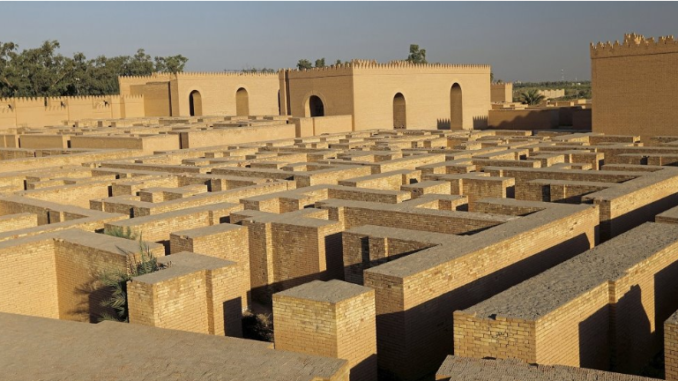
Ancient city of Babylon designated UNESCO World Heritage Site after a vote that followed decades of lobbying by Iraq
The ancient city of Babylon, first referenced in a clay tablet from the 23rd century B.C., was designated a UNESCO World Heritage Site after a vote that followed decades of lobbying by Iraq. The vote, at a UNESCO World Heritage Committee meeting in Azerbaijan’s capital Baku, made the ancient Mesopotamian city on the Euphrates River the sixth world heritage site within the borders of a country known as a cradle of civilization.

Iraqi President Barham Salih said the city, now an archaeological ruin, was returned to its “rightful place” in history after years of neglect by previous leaders. The government said it would allocate funds to maintain and boost conservation efforts.
Babylon, about 85 kilometers south of Baghdad, was once the center of a sprawling empire, renowned for its towers and mudbrick temples. Its hanging gardens were one of the seven ancient wonders of the world, commissioned by King Nebuchadnezzar II.
Visitors can stroll through the remnants of the brick and clay structures which stretch across 10 square kilometers, and see the famed Lion of Babylon statue, as well as large portions of the original Ishtar Gate. As the sun began to set on the crumbling ruins, activists and residents flocked to the replica Ishtar gate at the site’s entrance to celebrate what they called a historic moment.
It would allow for further exploration and research, said Makki Mohammad Farhoud, a tour guide at the site for more than 25 years, noting that only 18% of it had been excavated.
Excavations of what was once the largest city in the world, began in the early 19th century by European archaeologists, who removed many artifacts. In the 1970s, under President Saddam Hussein’s restoration project, the southern palace’s walls and arches were shoddily rebuilt on top of the existing ruins, causing widespread damage.
This was exacerbated during the U.S.-led invasion of Iraq in 2003, when U.S. and Polish troops stationed nearby built their military base on top of the ruins.
Many inscriptions written by soldiers can still be seen on the ancient bricks.
The site is in dire need of conservation, Farhoud said. Unlike three other World Heritage sites in Iraq, UNESCO did not designate Babylon as one in “in danger” after objections from the Iraqi delegation.
Iraq is replete with thousands of archaeological sites, many of which were heavily damaged or pillaged by Islamic State during its barbaric rule which ended in 2017.
The other five World Heritage Sites are the southern marshlands, Hatra, Samarra, Ashur and the citadel in Erbil, the capital of Iraq’s Kurdistan Region.
REUTERS
NAUČTE SE GRAMATIKU PODLE TEXTU
Podívejme se na přídavné jméno s koncovkou -ic, a to ve větě „… what they called a historic moment.“ („… co nazývají historickým momentem.“) Přídavná jména s koncovkou -ic nebo -ical mají podobný, ne však stejný význam. Výraz historic vyjadřuje důležitost, slovo historical spíše přímou spojitost s historií, např. historical period (historické období). Podobně např. economic – economical (týkající se ekonomiky – úsporný), electric – electrical (fungující na elektřinu – týkající se elektřiny), music – musical (týkající se hudby – produkující hudbu), classic – classical (typický – tradiční).
Zvolte správný výraz:
The politician will have a historic / historical speech. He became an electric / electrical engineer. The country deals with economic / economical recession.
SLOVÍČKA
designate prohlásit
clay keramická hlína
cradle kolébka
neglect zanedbání
allocate přidělit, rozdělit
boost zvýšit, podpořit
sprawl táhnout, prostírat se
renowned proslulý, slavný
mudbrick nepálená cihla
hanging visutý
wonder div, zázrak
stroll procházet se
remnants zbytky, pozůstatky
famed slavný, proslulý
crumble rozpadat, drolit se
flock shromáždit, hrnout se
note poznamenat
excavate odkrýt vykopávkami
shoddily nekvalitně
widespread rozsáhlý
exacerbate zhoršit, prohloubit
inscription (vyrytý) nápis
dire zoufalý
objection námitka
replete plný
pillage drancovat, plenit
marshland mokřina, blata
Řešení: historic, electrical, economic
Náhledový obrázek:
General view of the ancient city of Babylon, a newly designated UNESCO World Heritage Site, near Hilla, Iraq. REUTERS
Zdroj LN
